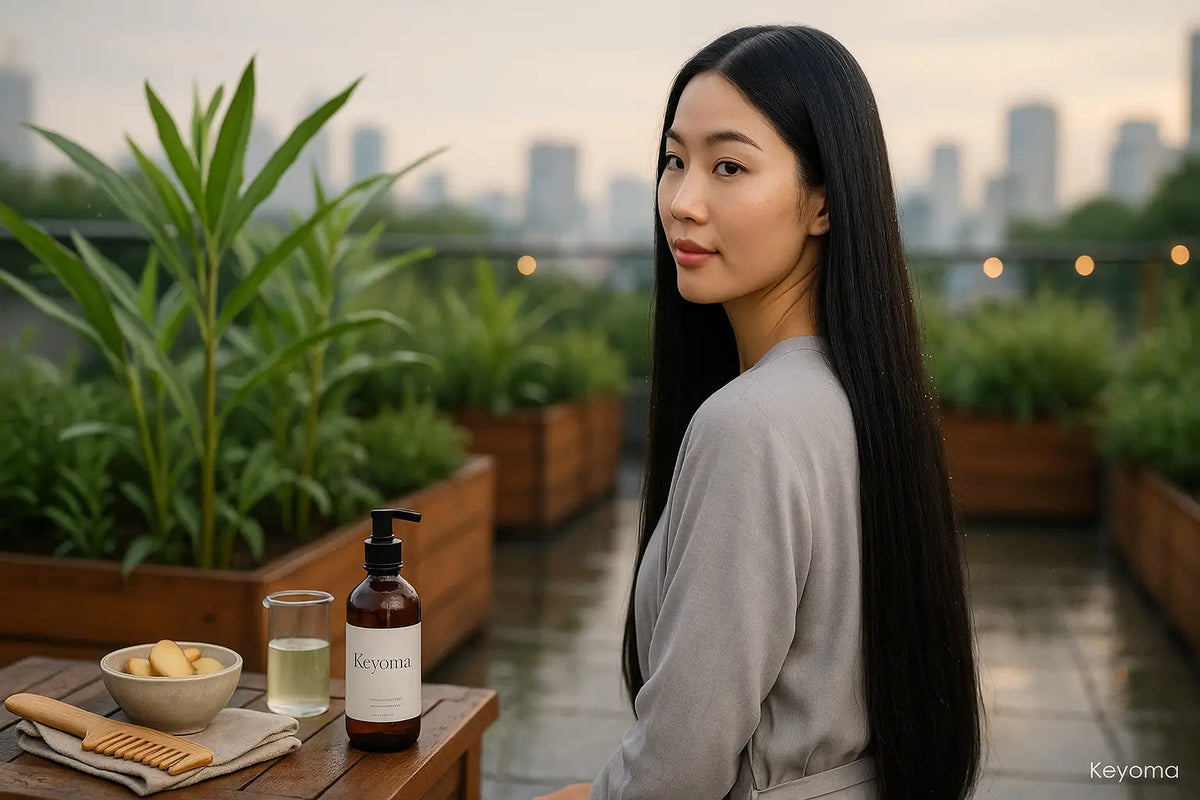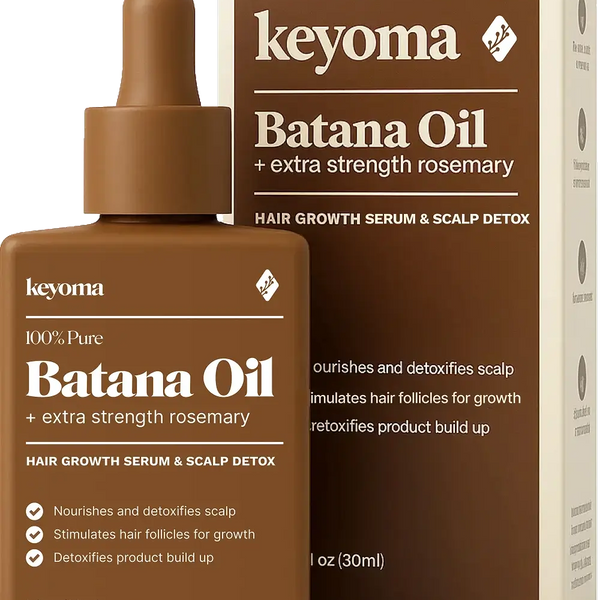In this article
Ginger can add heat to a stir-fry or brew a tasty tea, but did you know many people also use it for hair growth?
Ginger offers several hair-friendly perks. Here, you’ll see how ginger may help your hair, the ways to use it, and the research that supports its effects.
Key Takeaways
-
Ginger’s bioactives improve scalp circulation and may stimulate follicles for growth.
-
Antioxidant, antifungal, and antibacterial properties can reduce dandruff, itchiness, and shedding.
-
Essential fatty acids moisturize strands, improving softness, manageability, and reducing frizz.
-
Side effects can include irritation, patch testing helps identify allergies and sensitivity.
What Is Ginger?
While most people cook with ginger root, the plant itself is a flowering herb with a spicy, aromatic profile. It’s common in the kitchen and used in some traditional remedies and personal care. Native to South Asia, ginger contains bioactive compounds that bring a distinct flavor, aroma, and potential health benefits to foods.
It’s often noted for anti-inflammatory effects that support digestion, which helps explain its place in South Asian and worldwide cooking.
Beyond food, people use ginger to boost immunity, ease nausea, support gut health, calm gut-linked breakouts, improve scalp condition, and address dandruff and hair fall.
Hair Benefits of Ginger
Using ginger for hair is a quieter perk of this powerful kitchen staple. You see it everywhere in immunity shots, gut-health blends, and acne routines, yet ginger root for hair growth gets less attention. Consider looking past the sharp taste and bold flavor to how ginger can support your strands.

1. Encourages Hair Growth
A key compound in ginger, gingerol, improves scalp blood flow. With circulation up, hair follicles get stimulated more often, which can increase growth. It encourages faster, healthier, and more voluminous hair growth.
2. Helps Reduce Shedding
Oxidative stress can trigger shedding, and this is where ginger can help. Its antioxidant action helps keep oxidation in check and thus reduces hair fall and overall hair damage and breakage. It is an effective remedy for hair thinning as it strengthens the roots and nourishes the scalp
3. Fights Flakes and Dandruff
Flakes and dandruff are common, and ginger’s antifungal and antibacterial properties help manage them by lowering dandruff-causing bacteria and fungus. It can also calm an itchy, irritated, inflamed scalp and restore scalp health.
4. Conditions and Softens Strands
Ginger contains essential fatty acids that nourish, moisturize, and condition your scalp and hair shaft. With regular use, hair looks shinier and feels softer as frizz and dryness go down. It also helps detangle knots, making hair more manageable.
5. Helps Prevent Split Ends
By strengthening both the roots and the length, ginger helps cut down on split ends and reduces breakage. This helps your hair remain voluminous and dense.
6. Helps Delay Premature Graying
Because ginger is rich in natural antioxidants, it can reduce oxidative stress on the hair, which causes premature greying. Regular use of ginger for hair can help reduce this and maintain your natural color for longer.
Ginger Juice for Hair: Side Effects

Not everyone has side effects from ginger juice, but it can be a concern for some. The first step before you use ginger juice for hair is to know your allergies. If you are or have been allergic to ginger, avoid applying its extracts, juice, oil, or any form to your hair to prevent scalp or hair damage.
If you’re unsure about allergies or are using ginger for the first time, perform a patch test. Rub ginger root on your elbow and wait for 5 to 10 minutes to see any reaction and learn whether you’re allergic to ginger. If you notice a response, you’re most likely allergic.
Side effects of ginger juice for hair include itchiness, a burning sensation, welts, red rashes, and inflammation. Avoid oral intake of ginger, as it may cause side effects such as heartburn, gastric problems, cramps, and loose motion.
Doctors suggest not using lemon and ginger together as they may be too acidic. Similarly, those with coloured hair should also avoid using ginger juice for hair to help retain its colour.
How to Use Ginger for Hair Care
Using ginger on your hair can feel refreshing. Here are a few simple ways to use ginger in hair.

1. Ginger Juice Scalp Treatment
This spice has antiseptic and antifungal properties, and using ginger extract can help with even stubborn dandruff. Ginger juice also improves blood circulation and helps regulate your pH level.
Patch-testing behind my ear tended to keep any reactions at bay. You can extract the juice by blending it and straining the liquid through a muslin cloth.
The juice can then be used as a spot treatment for scaly patches and dandruff with a cotton ball. You can also mix this juice with other potent ingredients like lemon juice to increase the efficiency of the treatment.
2. Ginger-Based Cleansers or Shampoo
If you find the process of extracting ginger juice difficult, using a ginger-based cleanser or shampoo is a great choice. Using a ginger-based shampoo helps remove pesky dandruff, cleans your hair, and keeps it oil-free.
3. Ginger Oil for Hair
Hair oils are one of the best ways to support the overall health of your hair and scalp. Many brands offer ginger oil or ginger-infused oil, which repel dandruff and keep your hair healthy for a long time. If you get pure ginger oil, mix it with a carrier oil like coconut or castor oil for regular use.
4. Ginger Rinse for Hair
You might have heard about the trends and benefits of rice water and apple cider vinegar hair rinses. Combining ginger extract with these rinses can effectively treat dandruff while restoring your hair’s natural shine and health.
5. Hair Masks with Ginger
Hair masks are perfect for adding an intense boost of moisture to your hair and reversing environmental and heat damage.
Adding a highly potent ingredient like ginger extract to your hair mask lets you reap extra benefits such as combating dandruff. You can choose a ready-made hair mask infused with ginger extract or create your own mask!
Try a Patch-Tested Ginger Scalp Trial This Week with Keyoma
Skip trial-and-error and control ginger with risk moves.
Three-step plan:
-
Patch test first on the inner elbow for 5 to 10 minutes and only proceed if the skin stays calm.
-
Protect color and comfort by skipping straight ginger juice on dyed hair; use a ginger-infused oil as a short pre-wash or a ginger-based shampoo so you rinse it off clean.
-
Prevent acid stacking: never pair ginger with lemon on the scalp, and widen the gap between uses if you feel heat, itch, welts, or burning.
For dilution charts, rinse timing, and a printable patch-test card, visit the Keyoma Hair Care blog.
Featured Product
100% Pure Batana Oil + Rosemary









